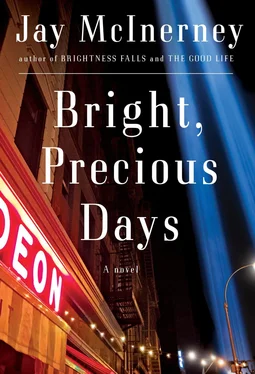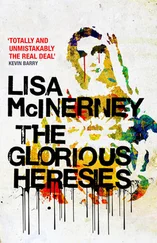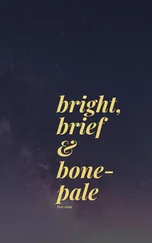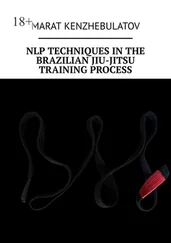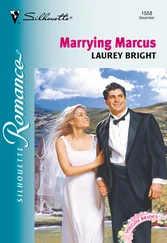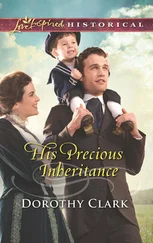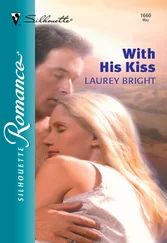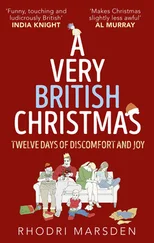Jay McInerney
Bright, Precious Days
Every marriage is its own culture, and even within it, mystery is the environment.
— RICHARD HELL
ONCE, NOT SO VERY LONG AGO, young men and women had come to the city because they loved books, because they wanted to write novels or short stories or even poems, or because they wanted to be associated with the production and distribution of those artifacts and with the people who created them. For those who haunted suburban libraries and provincial bookstores, Manhattan was the shining island of letters. New York, New York: It was right there on the title pages — the place from which the books and magazines emanated, home of all the publishers, the address of The New Yorker and The Paris Review, where Hemingway had punched O’Hara and Ginsberg seduced Kerouac, Hellman sued McCarthy and Mailer had punched everybody, where — or so they imagined — earnest editorial assistants and aspiring novelists smoked cigarettes in cafés while reciting Dylan Thomas, who’d taken his last breath in St. Vincent’s Hospital after drinking seventeen whiskeys at the White Horse Tavern, which was still serving drinks to the tourists and the young litterateurs who flocked here to raise a glass to the memory of the Welsh bard. These dreamers were people of the book; they loved the sacred New York texts: The House of Mirth, Gatsby, Breakfast at Tiffany’s et al., but also all the marginalia: the romance and the attendant mythology — the affairs and addictions, the feuds and fistfights. Like everyone else in their lousy high school, they’d read The Catcher in the Rye, but unlike everyone else they’d really felt it — it spoke to them in their own language — and they secretly conceived the ambition to one day move to New York and write a novel called Where the Ducks Go in Winter or maybe just The Ducks in Winter.
Russell Calloway had been one of them, a suburban Michigander who had an epiphany after his ninth-grade teacher assigned Thomas’s “Fern Hill” in honors English, who subsequently vowed to devote his life to poetry until A Portrait of the Artist as a Young Man changed his religion to fiction. Russell went east to Brown, determined to acquire the skills to write the great American novel, but after reading Ulysses —which seemed to render most of what came afterward anticlimactic — and comparing his own fledgling stories with those written by his Brown classmate Jeff Pierce, he decided he was a more plausible Maxwell Perkins than a Fitzgerald or Hemingway. After a postgraduate year at Oxford he moved to the city and eventually landed a coveted position opening mail and answering the phone for legendary editor Harold Stone, in his leisure hours prowling the used bookstores along Fourth Avenue in the Village, haunting the bars at the Lion’s Head and Elaine’s, catching glimpses of graying literary lions at the front tables. And if the realities of urban life and the publishing business had sometimes bruised his romantic sensibilities, he never relinquished his vision of Manhattan as the mecca of American literature, or of himself as an acolyte, even a priest, of the written word. One delirious night a few months after he arrived in the city, he accompanied an invited guest to a Paris Review party in George Plimpton’s town house, where he shot pool with Mailer and fended off the lisping advances of Truman Capote after snorting coke with him in the bathroom.
Though the city after three decades seemed in many ways diminished from the capital of his youth, Russell Calloway had never quite fallen out of love with it, nor with his sense of his own place here. The backdrop of Manhattan, it seemed to him, gave every gesture an added grandeur, a metropolitan gravitas.
Not long after he became an editor, Russell had published his best friend Jeff Pierce’s first book — a collection of stories; and then, after Jeff died, his novel, two of the main characters in which — it could not be denied — were inspired by Russell and his wife, Corrine. Editing that book would have been difficult enough, given its not-quite-finished state, even if it hadn’t involved a love triangle featuring a married couple and their closest friend, but Russell was proud of the scrupulous, sometimes painful professionalism with which he’d tried to implement Jeff’s intentions. The novel, Youth and Beauty, was generously praised by the critics — including several who’d been unkind about his debut — as books by recently deceased authors often are, especially those who die young and in a manner that confirms the myth of the artist as a self-destructive genius. Even before the book was published there was spirited bidding for the film rights. It sold well in hardcover and again, a year later, in paperback, and then its sales fell off, dwindling into the double digits a few years back, its author little more than a name associated with the period of big hair and big shoulder pads, yet another of the victims of the great epidemic that scythed the ranks of the artistic community, although, as a heterosexual, he didn’t really fit the profile of the plague narrative and his fiction had more in common with that of James Gould Cozzens or John O’Hara than with the high-gloss, coke-fueled prose of his famous contemporaries. Over time his reputation faded like the Polaroids from their days at Brown. Then, gradually, almost inexplicably, the book and its author had been resurrected.
This process first came to Russell’s attention with a long essay in the inaugural issue of a magazine called The Believer, which Jonathan Tashjian, his PR director, had shown him. The writer of the essay claimed to be part of a growing legion of fans, and cited a Web site, Lovejeffpierce.com. Just when Russell had begun to suspect that earnest young people cared much less about literature than his own generation had, a new wave of book people rose up to adopt Jeff. The appetite for his work was fed in part by its very obscurity and by the lack of availability of the books, which had fallen out of print, abetted by a sudden interest in the eighties on the part of those who were too young to have really experienced that decade. Not long after he took command of his own publishing house, Russell bought back the rights to both books and quickly reprinted them. The sales figures thus far did not begin to reflect the intensity of interest on the part of the early adopters, and Russell could only assume that these true believers would lose interest if and when the books again became popular. Still, the second-generation interest had caught the attention of a production company, which picked up the lapsed movie option, and as literary executor Russell had gotten Corrine attached to the project as a screenwriter; her critically praised adaptation of Graham Greene’s The Heart of the Matter, released the previous year in seven or eight theaters worldwide before going to video, having given her just enough credibility to merit a first crack at the script. After two drafts they wanted to hire a new writer, but Russell had insisted that Corrine stay involved. Though they hadn’t heard from the would-be producers in almost a year, the option had been renewed again just a few weeks ago.
In the meantime, he’d agreed to have lunch with the creator of another Jeff Pierce Web site, one Astrid Kladstrup. Unlike some of his colleagues, Russell believed in the potential importance of the Internet and the blogosphere, which he himself had difficulty plumbing; this was one of the main reasons he’d hired Jonathan, who lived in that world, and also why he’d agreed to talk to this young fan, although he’d possibly been unduly influenced by a photo of Jeff’s latest fan on the Web site.
Читать дальше
